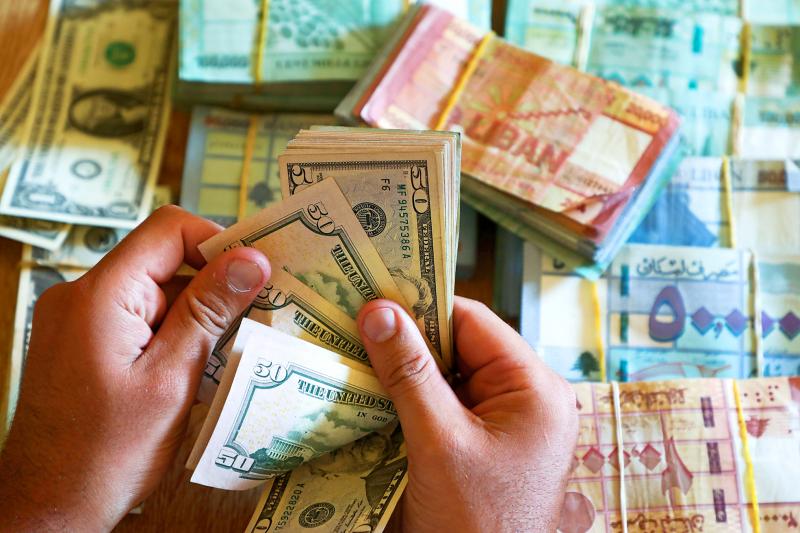The US dollar on Friday extended its advance against a basket of currencies, building on gains logged after the US Federal Reserve earlier this week surprised markets by signaling it would raise interest rates and end emergency bond-buying sooner than expected.
The US dollar index, which tracks the greenback against six major currencies, closed up 0.47 percent at 92.32, its highest since mid-April. The index rose 1.95 percent from a week earlier.
The jolt to foreign exchanges was on Wednesday triggered by Fed forecasts showing 13 of the 18-person policy board saw rates rising in 2023, versus only six previously, with the median board member tipping two hikes in 2023.

Photo: Reuters
Investors’ risk appetite took another hit after St Louis Fed President James Bullard on Friday said that the US central bank’s shift this week toward a faster tightening of monetary policy was a “natural” response to economic growth and particularly inflation moving quicker than expected as the country reopens from the COVID-19 pandemic.
“I think this is a direct echo of the 2013 taper tantrum. You are seeing a perceived shift in the Fed’s reaction function driving investors into the safety of the US dollar,” said Karl Schamotta, chief market strategist at Cambridge Global Payments in Toronto.
With investors pricing in a sooner-than-expected tapering of extraordinary US monetary stimulus, the euro and the yen have come under selling pressure over the past few trading sessions.
“Essentially, the entire world was short the dollar going into this, everyone from speculative traders to corporates to investors,” Schamotta said.
“You are seeing a wholesale unwind here,” he said.
The unwind of sizeable bearish bets against the US dollar is expected to provide support for the greenback in coming days, investors said.
Goldman Sachs Asset Management head of currency Arnab Nilim, who had been short the US currency headed into this month’s Fed meeting, said he has reduced the position and expects the US dollar to perform well, especially against the low-yielding currencies.
With a dovish European Central Bank seemingly far behind the Fed in the monetary policy cycle, traders will be reluctant to buy euros against US dollars.
“The US central bank is one step ahead and as a result USD is likely to remain well supported against the EUR,” Commerzbank strategists wrote in their daily note.
With equity markets hurting, the Australian dollar — seen as a proxy for risk appetite — was down 0.68 percent at US$0.74995, its lowest since December last year.
In Taipei on Friday, the New Taiwan dollar declined against the US dollar, losing NT$0.045 to close at NT$27.810, down 0.65 percent for the week.
Sterling extended its fall against the US dollar, dropping below US$1.39, hurt by the Fed’s hawkish surprise and an unexpected fall in Britain’s retail sales.
Additional reporting by CNA, with staff writer

Semiconductor shares in China surged yesterday after Reuters reported the US had ordered chipmaking giant Taiwan Semiconductor Manufacturing Co (TSMC, 台積電) to halt shipments of advanced chips to Chinese customers, which investors believe could accelerate Beijing’s self-reliance efforts. TSMC yesterday started to suspend shipments of certain sophisticated chips to some Chinese clients after receiving a letter from the US Department of Commerce imposing export restrictions on those products, Reuters reported on Sunday, citing an unnamed source. The US imposed export restrictions on TSMC’s 7-nanometer or more advanced designs, Reuters reported. Investors figured that would encourage authorities to support China’s industry and bought shares

TECH WAR CONTINUES: The suspension of TSMC AI chips and GPUs would be a heavy blow to China’s chip designers and would affect its competitive edge Taiwan Semiconductor Manufacturing Co (TSMC, 台積電), the world’s biggest contract chipmaker, is reportedly to halt supply of artificial intelligence (AI) chips and graphics processing units (GPUs) made on 7-nanometer or more advanced process technologies from next week in order to comply with US Department of Commerce rules. TSMC has sent e-mails to its Chinese AI customers, informing them about the suspension starting on Monday, Chinese online news outlet Ijiwei.com (愛集微) reported yesterday. The US Department of Commerce has not formally unveiled further semiconductor measures against China yet. “TSMC does not comment on market rumors. TSMC is a law-abiding company and we are

FLEXIBLE: Taiwan can develop its own ground station equipment, and has highly competitive manufacturers and suppliers with diversified production, the MOEA said The Ministry of Economic Affairs (MOEA) yesterday disputed reports that suppliers to US-based Space Exploration Technologies Corp (SpaceX) had been asked to move production out of Taiwan. Reuters had reported on Tuesday last week that Elon Musk-owned SpaceX had asked their manufacturers to produce outside of Taiwan given geopolitical risks and that at least one Taiwanese supplier had been pushed to relocate production to Vietnam. SpaceX’s requests place a renewed focus on the contentious relationship Musk has had with Taiwan, especially after he said last year that Taiwan is an “integral part” of China, sparking sharp criticism from Taiwanese authorities. The ministry said

US President Joe Biden’s administration is racing to complete CHIPS and Science Act agreements with companies such as Intel Corp and Samsung Electronics Co, aiming to shore up one of its signature initiatives before US president-elect Donald Trump enters the White House. The US Department of Commerce has allocated more than 90 percent of the US$39 billion in grants under the act, a landmark law enacted in 2022 designed to rebuild the domestic chip industry. However, the agency has only announced one binding agreement so far. The next two months would prove critical for more than 20 companies still in the process